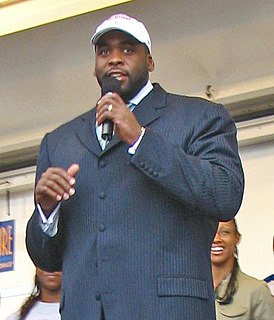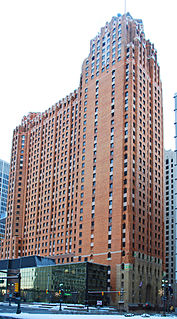A write-in candidate is a candidate in an election whose name does not appear on the ballot, but for whom voters may vote nonetheless by writing in the person's name. The system is almost totally confined to elections in the United States. Some U.S. states and local jurisdictions allow a voter to affix a sticker, with the write-in candidate's name, to the ballot in lieu of actually writing in the candidate's name. Write-in candidacies are sometimes a result of a candidate being legally or procedurally ineligible to run under his or her own name or party; write-in candidacies may be permitted where term limits bar an incumbent candidate from being officially nominated for, or being listed on the ballot for, re-election. In some cases, write-in campaigns have been organized to support a candidate who is not personally involved in running; this may be a form of draft campaign.

The government of Detroit, Michigan is run by a mayor, the nine-member Detroit City Council, the eleven-member Board of Police Commissioners, and a clerk. All of these officers are elected on a nonpartisan ballot, with the exception of four of the police commissioners, who are appointer by the mayor. Detroit has a "strong mayoral" system, with the mayor approving departmental appointments. The council approves budgets, but the mayor is not obligated to adhere to any earmarking. The city clerk supervises elections and is formally charged with the maintenance of municipal records. City ordinances and substantially large contracts must be approved by the council.

The 2008 congressional elections in Michigan were held on November 4, 2008 to determine who would represent the state of Michigan in the United States House of Representatives. Michigan had fifteen seats in the House, apportioned according to the 2000 United States Census. Representatives are elected for two-year terms; those elected will serve in the 111th Congress from January 4, 2009 until January 3, 2011. The election coincided with the 2008 U.S. presidential election.

Kenneth Vern "Ken" Cockrel Jr. is an American politician and journalist from the state of Michigan who served as the 73rd mayor of Detroit. He was president of the Detroit City Council from 2005 until September 17, 2008, when he was sworn in as the interim mayor, with his term in office beginning September 19. The previous mayor, Kwame Kilpatrick had announced on September 4, 2008 that he would resign after pleading guilty to state charges about his conduct in office. This resulted in Cockrel succeeding him as the Mayor of Detroit.

The Detroit mayoral elections of 2009 took place on May 5, 2009, with a primary on February 24, 2009 to fill the vacancy created when Kwame Kilpatrick resigned as mayor.

The 2013 United States elections were held on Tuesday, November 5, 2013. This off-year election featured several special elections to the United States Congress; two gubernatorial races; state legislative elections in a few states; and numerous citizen initiatives, mayoral races, and a variety of other local offices on the ballot.

The 2012 United States House of Representatives elections in Michigan was held on Tuesday, November 6, 2012, to elect the 14 U.S. Representatives from the state of Michigan, a decrease of one following the 2010 United States Census. The elections coincided with the elections of other federal and state offices, including a quadrennial presidential election and an election to the U.S. Senate. Primary elections were held on August 7, 2012. The filing deadling for candidates to file to run in the primary was May 15. Except for two seats, all the incumbents sought re-election. The open seats were the 5th and 11th Congressional Districts. Due to the loss of one seat from the 2010 Census, two congressmen ran against each other. Despite Democrats winning more than 240,000 more votes for U.S. House districts statewide, Republicans won nine of 14 seats and Michiganders tied a state record by electing the lowest rate of U.S. Representatives by a major party whilst simultaneously casting its electoral votes for that party's presidential nominee.

The Michigan gubernatorial election of 2014 took place on November 4, 2014, to elect the Governor of Michigan, concurrently with the election of Michigan's Class II U.S. Senate seat, as well as other elections to the United States Senate in other states and elections to the United States House of Representatives and various state and local elections.

The 2014 U.S. House of Representatives elections in Michigan will be held on Tuesday, November 4, 2014, to elect the 14 members of the U.S. House of Representatives from the state of Michigan, one from each of the state's 18 congressional districts. The elections will coincide with the elections of other federal and state offices, including the election of Michigan's governor, as well as the Class 2 U.S. Senate Seat
Michael Thaddeus Dugeon was a candidate for the 2013 mayoral election in Detroit, Michigan. He entered the race as a write-in candidate.
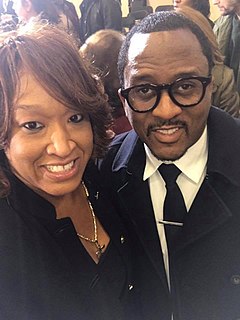
Brian Roderick Banks is a Democratic former member of the Michigan House of Representatives and current candidate for the Democratic nomination in the 2nd District of the Michigan Senate.
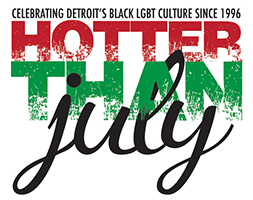
Hotter Than July! is an annual week-long black LGBT Pride celebration held annually since 1996 in Detroit, Michigan which includes events each day culminating with a large festival on the final weekend. The Detroit Black Pride Society and KICK partner to produce Hotter Than July.

The 2016 United States House of Representatives elections in Michigan were held on November 8, 2016, to elect the 14 U.S. Representatives from the state of Michigan, one from each of the state's 14 congressional districts. The elections coincided with the 2016 U.S. presidential election, as well as other elections to the House of Representatives, elections to the United States Senate in 33 other states and various state and local elections. The deadline for candidates to file for the August 2 primary election was April 19.
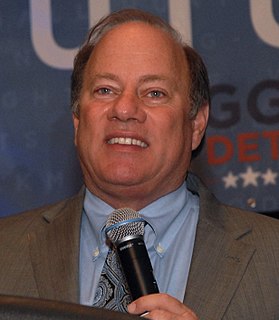
The 2017 Detroit mayoral election was held on November 7, 2017, to elect the Mayor of Detroit. It was the first mayoral election for the city since it emerged from state control under Michigan's emergency manager law. Incumbent Mike Duggan won re-election to a second term.

Tenisha Yancey is a Democratic member of the Michigan House of Representatives, representing the 1st House District. The 1st House District comprises the cities of Harper Woods, Grosse Pointe Woods, Grosse Pointe Shores and a portion of Detroit.

Pamela Sossi, is an American attorney based in Detroit, Michigan. She is the senior partner at The Law Office of Pamela M. Sossi, PLLC, and is an occasional legal commentator on 910AM WFDF and WHPR TV33. Her practice focuses on criminal defense, business litigation and civil rights litigation. Sossi also serves as a public defender in Harper Woods and Detroit.







